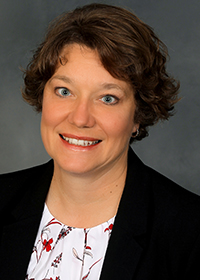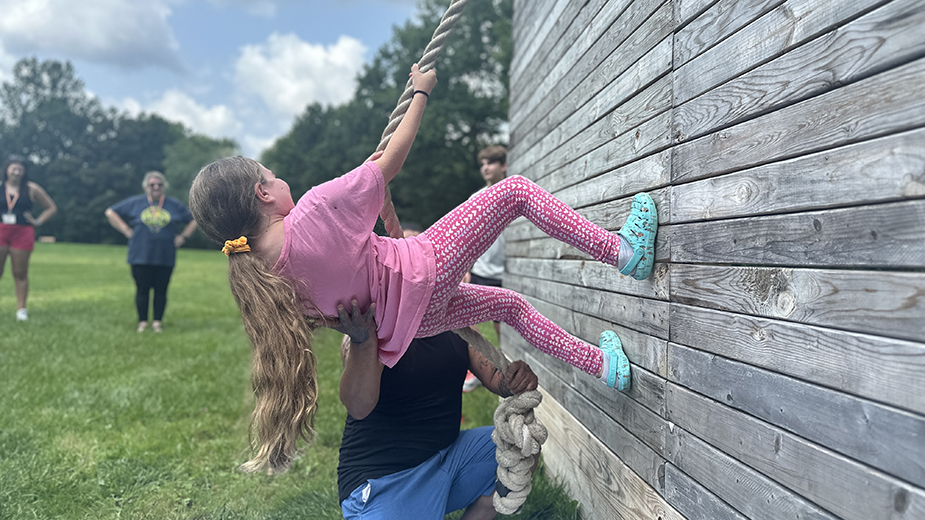HERMITAGE, Pa. – When Pam Ladner’s teenage autistic daughter decided she was transgender, Ladner was uncertain where to turn for answers. So, she formed an organization, LGBTQIA+ Alliance to help her daughter and others like her find resources and support.
That organization benefited this year through the work of the Buhl Regional Health Foundation based in Hermitage, Pa.
“The foundation assistance couldn’t have come at a better time,” Ladner says. “It’s helped to keep us afloat.”
Last year, the foundation began focusing its attention on the health of Mercer County youths, according to Jennifer Barborak, executive director.
This year, Barborak says it distributed $2.3 million in grants. She notes there were two requests for proposals – one to expand operations at day care centers and the other geared toward LGBTQ children.
Day Care Facilities

Three day care centers were chosen, each to expand in different ways.
Barborak calls one of them, the Zion Education Center, particularly exciting because it was expanding hours to accommodate parents working second shifts.
A second day care, the Buhl Club Child Development Center in Sharon, Pa., expanded its operating space.
The third, Building Blocks Child Center, has a 26-family waiting list and a five-year plan to expand, says its director, Carrie Brown.
“The first stage is to increase staffing by providing children with the most successful academic, social emotional experience we can,” Brown says. Funding from Buhl will enable more children to be served while maintaining the required child-to-staff ratios.
“We’re very blessed at Building Blocks. …We’re in a position to expand our classrooms and we have our staff to support that,” she says.
LGBTQIA+ Alliance
Following the killing in Sharon, Pa., this June of 14-year-old Pauly Likens, whom some family members identified as a transgender teenager, Barborak says it became a focus to help that community. The LGBTQIA+ Alliance sought foundation grant dollars to expand its programs.
Ladner, founder of the alliance, says the organization has gone from renting meeting space at a library to its own small location where teens can find informative materials, art supplies to deal with anxiety and a community of similar teens. Resources include referrals to counselors, events such as a Pride picnic and a prom event, advice on hair and cosmetics and available products. Parents can get answers, as well.
“I tell them it’s a journey. Where you start is not where you end up,” says Ladner, whose daughter now identifies as nonbinary.
Future goals include a larger building with an emergency shelter room and a safe spaces program throughout Mercer County where LGBTQIA youths can decompress without being out and alone, especially at night.
Besides covering costs of the group’s space, funds from the foundation are being used to expand the library so there are additional copies of materials.
Other Projects
A five-day grief day camp for about 30 young students, now in its third year, and a grief support group at Thiel College for teenagers, are both supported by the Buhl Foundation. Students learn coping skills and that they are not alone.
“A lot of times when your mom or dad passes away, you feel like you’re the only kid in your school who has had that happen. But this allows them to see there are other kids going through the same thing they are going through,” Barborak says.
The foundation also provided $200,000 in scholarships for students going into the health care field, including six $10,000 scholarships. One scholarship recipient, a dental student came back to volunteer at the dental clinic the foundation helps to support.
Barborak says the dental clinic brought in Remote Access Medicine with 270 volunteers who helped 285 people to obtain $170,000 worth of care. One dentist, Dr. John Clemenza, is expanding his office at the LindenPointe campus in Hermitage, Pa. Two of his rooms there will provide dental services five to seven days each month to low- or moderate-income individuals referred there.
“There is such a need for dental care in our community,” Barborak says. “Primary Health Network says they are working on waiting lists.”
University of Pittsburgh dental students work with local dentists, to staff that clinic, and Barborak hopes some students will like the community and practice there in the future.
Additionally, 160 automated external defibrillators (AEDs) have been provided throughout the community at school districts, churches and athletic fields. The locations are well known to 911 dispatchers, who can direct people to them.
Similarly, the foundation has helped to train 820 people in hands-only CPR.
Barborak says the foundation soon will implement a digital hub, which will help social workers to find resources more quickly and easily.
“Social workers have been complaining that they spin their wheels making phone call after phone call. It’s very time consuming,” Barborak says.
“This is something our Community Health Task Force came up with, the idea that if the organizations would be keyed into this hub and update their services, that it would be extremely beneficial to pull together the care, the social determinants of health needs for our community.”
Barborak says the Community Health Task Force, made up of CEOs from local hospitals, is looking for other programs and ways to better meet health care needs in Mercer County.
Collection of data is yet another way they hope to meet those needs. As such, Jessica Koss, currently the executive team assistant at the foundation, will assume the role of director of community engagement.
Barborak says the foundation grows each year and Koss’s new role will help to ensure the services are making a difference and reaching people they should be reaching.
By gathering more data, not just statistics but also the stories behind them, the organization will be able tell how many are being served and in how many different ways.
For instance, the data would help to determine if the students going through grief camp are doing better in school or of the long-term impact of the doula program at UPMC Magee Women’s Center. Doulas are trained professionals who provide physical and emotional support to mothers before, during and shortly after childbirth.
Another example is the birth simulator funded at UPMC that is used to train EMTs, paramedics and hospital staff: Is it helping them to recognize and intervene earlier in a high-risk birth.
“We’re hoping the data that we’re collecting will be beneficial for the community,” Barborak says, adding that organizations may be able to see where needs are and apply for grants to fill those needs.
Pictured at top: Youngsters participate at Camp Courage, a grief support day camp held in Buhl Park each summer, which teaches overcoming obstacles and other coping skills such as art and equine therapy.
